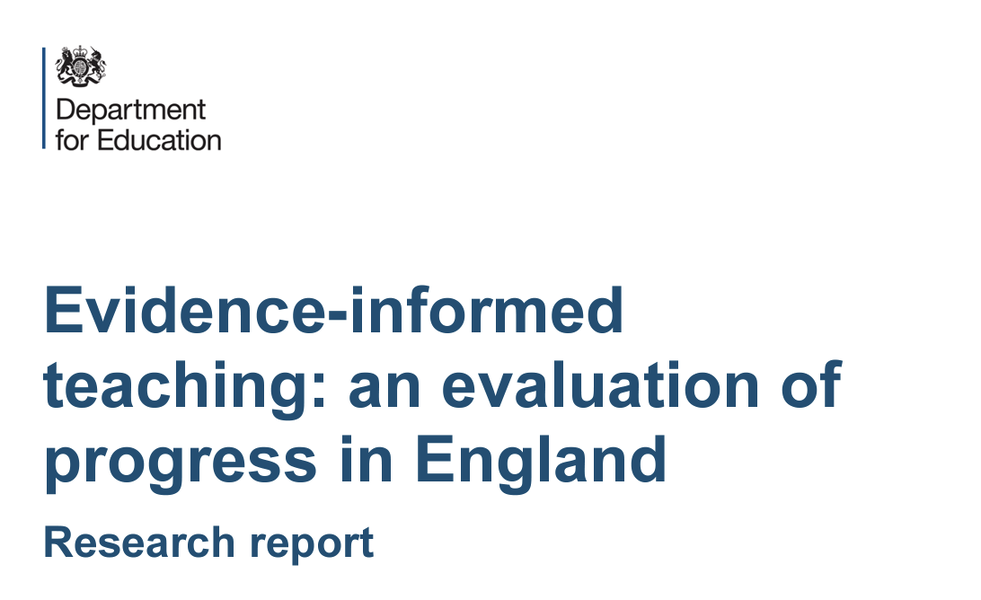
We all agree that evidence-based teaching has the potential to elevate the quality of teaching and learning. Or do we?
In 2017 the UK Department for Education published ‘Evidence-informed teaching: an evaluation of progress in England’, with the findings that:
“…teachers interviewed were on a continuum, from a small number of teachers against the use of research evidence; with others neutral (generally due to lack of time or not seeing the value); towards(for most teachers) being generally able to see the value but needing to be convinced by seeing its use in action; to - in a few cases - those having both access to research and seeing the value of it."
The report also found that:
"For teachers, evidence-informed teaching usually meant drawing on research evidence (directly or as translated by school leaders) to integrate and trial in their own practice, rather than directly applying research findings. "(UK Department for Education, 2017).
In essence, the report offers that a significant proportion of teachers are either failing to be convinced by best research-based practices or are not using them as suggested. These suggest the need for schools to utilise a comprehensive professional development program that addresses teachers' varying levels of engagement with evidence-informed teaching as well as standardising its use across the school.
How can we communicate the importance of holistic evidence-based professional development?
1. Practical Application: Professional development should go beyond presenting research findings and focus on translating research into actionable strategies. Teachers need support to integrate evidence-informed practices into their own teaching contexts, allowing them to see the direct impact on student learning.
2. Collaboration and Peer Learning: We need to encourage collaboration among teachers creating a supportive environment for learning and sharing best practices. Collaborative opportunities enable teachers to observe evidence-informed teaching in action, exchange ideas, and gain inspiration from their peers.
3. Reflective Practice and Feedback: Promoting reflective practice allows teachers to critically analyse their own teaching practices, identify areas for growth, and adjust their approaches accordingly. Providing feedback, both from colleagues and instructional leaders, further enhances the effectiveness of evidence-informed teaching.
How can we foster a culture of continuous growth?
1. Leadership Support: School leaders play a pivotal role in creating a culture that values evidence-based professional development. They need to address one of the main blockers for over stretched teachers to engage with research by allocating time! In addition they need to provide resources for professional learning, provide access to research-based training, and model the use of evidence-informed practices.
2. Establish professional learning communities: Establishing professional learning communities within schools encourages collaboration, sharing of research-based insights, and joint problem-solving. These communities provide a platform for teachers to discuss challenges, share successes, and collectively strive for improvement.
3. Access to evidence-based professional development: This is vital in helping bridge the gap between research and practice, making it easier for teachers to engage with and apply evidence-informed teaching strategies.
To enhance the quality of teaching and learning across the school, a holistic evidence-based professional development program is essential. By giving the time for teachers to develop collaboration and reflective practice, emphasising practical application, and creating a culture of continuous growth, schools can empower teachers to embrace evidence-informed teaching practices.
Through this comprehensive approach, we can unlock the full potential of evidence-based teaching, improving student outcomes and driving educational excellence.
Phillip Lupton
Owner and Director of Education
Elm Education
In 2017 the UK Department for Education published ‘Evidence-informed teaching: an evaluation of progress in England’, with the findings that:
“…teachers interviewed were on a continuum, from a small number of teachers against the use of research evidence; with others neutral (generally due to lack of time or not seeing the value); towards(for most teachers) being generally able to see the value but needing to be convinced by seeing its use in action; to - in a few cases - those having both access to research and seeing the value of it."
The report also found that:
"For teachers, evidence-informed teaching usually meant drawing on research evidence (directly or as translated by school leaders) to integrate and trial in their own practice, rather than directly applying research findings. "(UK Department for Education, 2017).
In essence, the report offers that a significant proportion of teachers are either failing to be convinced by best research-based practices or are not using them as suggested. These suggest the need for schools to utilise a comprehensive professional development program that addresses teachers' varying levels of engagement with evidence-informed teaching as well as standardising its use across the school.
How can we communicate the importance of holistic evidence-based professional development?
1. Practical Application: Professional development should go beyond presenting research findings and focus on translating research into actionable strategies. Teachers need support to integrate evidence-informed practices into their own teaching contexts, allowing them to see the direct impact on student learning.
2. Collaboration and Peer Learning: We need to encourage collaboration among teachers creating a supportive environment for learning and sharing best practices. Collaborative opportunities enable teachers to observe evidence-informed teaching in action, exchange ideas, and gain inspiration from their peers.
3. Reflective Practice and Feedback: Promoting reflective practice allows teachers to critically analyse their own teaching practices, identify areas for growth, and adjust their approaches accordingly. Providing feedback, both from colleagues and instructional leaders, further enhances the effectiveness of evidence-informed teaching.
How can we foster a culture of continuous growth?
1. Leadership Support: School leaders play a pivotal role in creating a culture that values evidence-based professional development. They need to address one of the main blockers for over stretched teachers to engage with research by allocating time! In addition they need to provide resources for professional learning, provide access to research-based training, and model the use of evidence-informed practices.
2. Establish professional learning communities: Establishing professional learning communities within schools encourages collaboration, sharing of research-based insights, and joint problem-solving. These communities provide a platform for teachers to discuss challenges, share successes, and collectively strive for improvement.
3. Access to evidence-based professional development: This is vital in helping bridge the gap between research and practice, making it easier for teachers to engage with and apply evidence-informed teaching strategies.
To enhance the quality of teaching and learning across the school, a holistic evidence-based professional development program is essential. By giving the time for teachers to develop collaboration and reflective practice, emphasising practical application, and creating a culture of continuous growth, schools can empower teachers to embrace evidence-informed teaching practices.
Through this comprehensive approach, we can unlock the full potential of evidence-based teaching, improving student outcomes and driving educational excellence.
Phillip Lupton
Owner and Director of Education
Elm Education

